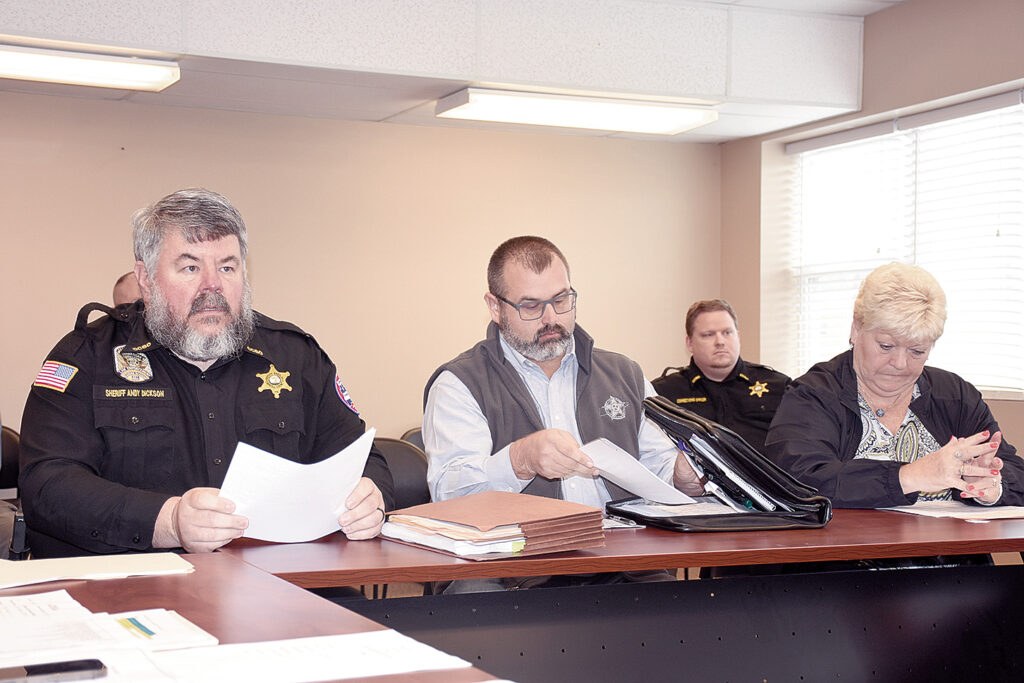Game Warden Surveillance Law ruled unconstitutional
Victory for property owners statewide Game Warden Surveillance Law ruled unconstitutional The Benton County Circuit Court ruled recently that a statute authorizing warrantless trespassing and surveillance by Tennessee game wardens is unconstitutional. The ruling is not just a victory for Benton County landowners Terry Rainwaters and Hunter Hollingsworth, who sued with the Institute for Justice (IJ) after the Tennessee Wildlife Resources Agency (TWRA) ignored their “No Trespassing” signs by entering and installing cameras on their land. The victory also applies broadly to private land across Tennessee. The decision was handed down by a three judge panel appointed by the state Supreme Court. Members of the panel included 24th Judicial Judge Donald Parish, of Huntingdon; Chancellor Jerri S. Bryant of the 10th Judicial District of Athens; and 22nd Judicial District Judge J. Russell Parkes. of Columbia. “For too long, TWRA officers have treated private land like public property—entering without permission, spying on people without a warrant, and doing it all with no meaningful oversight,” said IJ Attorney Joshua Windham. “Thanks to the court’s ruling, Tennesseans can now rest easy knowing that they’re secure from these sorts of intrusions on their land.” “The court’s decision to declare TWRA’s constant overreach and abuse of authority unconstitutional is restoring my faith in the justice system,” said Hunter Hollingsworth. “I’m grateful for the Institute for Justice’s hard work and dedication to preserving and restoring the rights of all property owners in Tennessee. Thanks also to my local attorney Jack Leonard, who has been with me on these issues from day one.” In addition to finding the law enabling searches unconstitutional, the court granted Rainwaters’ and Hollingsworth’s request for $1 in damages as compensation for the violation of their constitutional rights. The TWRA has 30 days to appeal the decision to the Tennessee Court of Appeals. “The Circuit Court wisely recognized that the Tennessee Constitution prohibits state officials from invading private property on their own say-so,” said IJ Senior Attorney Rob Frommer. “But due to the federal ‘open fields’ doctrine, game wardens across the nation continue to act like a law unto themselves. The Institute for Justice will keep pushing courts to repudiate that century-old mistake and restore citizens’ right to be secure on their own land.” TWRA thought that its warrantless searches were legal under the century-old federal “open fields” doctrine. In 1924, the U.S. Supreme Court held that the Fourth Amendment to the U.S. Constitution does not protect any land beyond the home and its immediately surrounding area. The Court reaffirmed the doctrine in 1984 when it held that property owners have no “reasonable expectation of privacy” on any private lands the Court deems to be an “open field.” But the Circuit Court ruled that the law enabling the searches violates the Tennessee Constitution, which Tennessee courts have long held gives landowners more protection than the U.S. Constitution. Additionally, the court found that the law amounted to a “general warrant” that gave officials wide latitude to conduct searches. In striking down the law the court noted that “general warrants are dangerous to liberty and ought not to be granted.” “It’s a great relief to have the court recognize that searching my property without permission and without a warrant was unconstitutional,” said Terry Rainwaters. “It’s even better to hear that the court doesn’t believe anyone else in Tennessee should have their rights violated in the same way. I’m going to sleep a little better tonight knowing that state officials have to respect my property rights.” The case is the first major victory for IJ’s Project on the Fourth Amendment, which strives to protect one of America’s foundational property rights: the right to be secure from unreasonable searches and seizures. IJ is currently defending an Ohio taxidermist subject to “whenever, wherever” inspections of his business, Pennsylvania hunting clubs challenging warrantless searches of their private property, and people in Los Angeles who had their security deposit boxes seized by the FBI. The Benton County Circuit Court ruled that a statute authorizing warrantless trespassing and surveillance by Tennessee game wardens is unconstitutional. The ruling is not just a victory for Benton County landowners Terry Rainwaters and Hunter Hollingsworth, who sued with the Institute for Justice (IJ) after the Tennessee Wildlife Resources Agency (TWRA) ignored their “No Trespassing” signs by entering and installing cameras on their land. The victory also applies broadly to private land across Tennessee. “For too long, TWRA officers have treated private land like public property—entering without permission, spying on people without a warrant, and doing it all with no meaningful oversight,” said IJ Attorney Joshua Windham. “Thanks to the court’s ruling, Tennesseans can now rest easy knowing that they’re secure from these sorts of intrusions on their land.” TWRA thought that its warrantless searches were legal under the century-old federal “open fields” doctrine. In 1924, the U.S. Supreme Court held that the Fourth Amendment to the U.S. Constitution does not protect any land beyond the home and its immediately surrounding area. The Court reaffirmed the doctrine in 1984 when it held that property owners have no “reasonable expectation of privacy” on any private lands the Court deems to be an “open field.” But the Circuit Court ruled that the law enabling the searches violates the Tennessee Constitution, which Tennessee courts have long held gives landowners more protection than the U.S. Constitution. Additionally, the court found that the law amounted to a “general warrant” that gave officials wide latitude to conduct searches. In striking down the law the court noted that “general warrants are dangerous to liberty and ought not to be granted.” “It’s a great relief to have the court recognize that searching my property without permission and without a warrant was unconstitutional,” said Terry Rainwaters. “It’s even better to hear that the court doesn’t believe anyone else in Tennessee should have their rights violated in the same way. I’m going to sleep a little better tonight knowing that state officials have to respect my property rights.” “The court’s decision to declare TWRA’s constant overreach and abuse of authority unconstitutional is restoring my faith in the justice system,” said Hunter Hollingsworth. “I’m grateful for the Institute for Justice’s hard work and dedication to preserving and restoring the rights of all property owners in Tennessee. Thanks also to my local attorney Jack Leonard, who has been with me on these issues from day one.” In addition to finding the law enabling searches unconstitutional, the court granted Rainwaters’ and Hollingsworth’s request for $1 in damages as compensation for the violation of their constitutional rights. The TWRA has 30 days to appeal the decision to the Tennessee Court of Appeals. “The Circuit Court wisely recognized that the Tennessee Constitution prohibits state officials from invading private property on their own say-so,” said IJ Senior Attorney Rob Frommer. “But due to the federal ‘open fields’ doctrine, game wardens across the nation continue to act like a law unto themselves. The Institute for Justice will keep pushing courts to repudiate that century-old mistake and restore citizens’ right to be secure on their own land.” The case is the first major victory for IJ’s Project on the Fourth Amendment, which strives to protect one of America’s foundational property rights: the right to be secure from unreasonable searches and seizures. IJ is currently defending an Ohio taxidermist subject to “whenever, wherever” inspections of his business, Pennsylvania hunting clubs challenging warrantless searches of their private property, and people in Los Angeles who had their security deposit boxes seized by the FBI.
- Home
- >
- AREA HAPPENINGS
- >
- Victory for property owners statewide
Victory for property owners statewide
- by Shirley Nanney
- March 29th, 2022

The Carroll County News-Leader is a full-service, premium newspaper and news website serving Carroll County, Tennessee. We take advantage of today’s digital technology to deliver you the news that matters to you in ways that are only possible in this platform and in print.
Contact us: [email protected]
Editor's Pick
March 24th, 2023
March 24th, 2023
March 24th, 2023
© Copyright 2024
newsleaderonline.com, 84 Elks Lodge Rd. Huntingdon, TN



